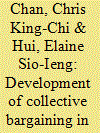| Srl | Item |
| 1 |
ID:
131958


|
|
|
|
|
| Publication |
2014.
|
| Summary/Abstract |
2010 was a turbulent year for labour relations in China. The wave of strikes sparked by the Honda workers has highlighted the urgent need for trade union reform and workplace collective bargaining. In response to this turbulence, the Chinese government has stepped up efforts to promote the practice of collective bargaining, which had been neglected under the existing "individual rights-based" labour regulatory framework. In the midst of rapid social and policy changes, this article aims to examine the effect of labour strikes on the development of collective bargaining in China. The authors argue that, driven by growing labour protests, the collective negotiation process in China is undergoing a transition, from "collective consultation as a formality," through a stage of "collective bargaining by riot," and towards "party state-led collective bargaining." This transition, however, is unlikely to reach the stage of "worker-led collective bargaining" in the near future.
|
|
|
|
|
|
|
|
|
|
|
|
|
|
|
|
| 2 |
ID:
189502


|
|
|
|
|
| Summary/Abstract |
Migrant construction workers are among the most vulnerable working populations in China as they are prone to facing the problem of wage arrears under the multi-tier subcontracting system. Based on ethnographic research of migrant construction workers in Tianjin, Shenzhen, Nanchang and Shaoguan, we examine workers’ divergent responses to wage arrears. While extant literature focuses on the positive role of informal networks in facilitating collective action, our findings indicate that the network structure between labour subcontractors and migrant workers plays a key role in enabling or constraining labour protests. We identify two network structures: the satellite network – characterized by arm's-length relationships between subcontractors and clusters of workers; and the spider-web network – characterized by strong relationships between subcontractors and their workers. We found that workers in satellite networks were prone to stage protests over wage arrears, but those in spider-web networks never held collective actions when facing the same problem. We argue that strong guanxi is a double-edged sword for the mobilization of labour protests and that workers’ responses to wage arrears are mediated through the network structure. Future studies may further scrutinize the role of a social network and its operating mechanisms in shaping workers’ working conditions and labour politics.
|
|
|
|
|
|
|
|
|
|
|
|
|
|
|
|